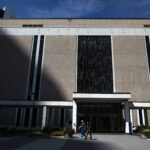Colorado justices skeptical of education co-ops’ ability to locate schools outside boundaries
Members of the Colorado Supreme Court gave a chilly reception on Tuesday to the idea that school boards, when organized into regional cooperatives to provide educational services, may locate facilities outside their boundaries over the objection of a local district.
Under Colorado law, boards of cooperative services, or BOCES, allow for school districts to band together and contract for additional services among their members. One of their powers is to construct buildings and purchase equipment “at any appropriate location, whether within or without a school district providing the money for the facilities.”
Recently, Education reEnvisioned BOCES, headquartered in Monument, took the position that “within or without” means it may open new schools anywhere in the state — not solely within the geographic boundaries of its member districts. But during oral arguments, members of the Supreme Court had a difficult time accepting the consequences of that interpretation.
“What I’m concerned about in your argument is that your BOCES,” said Justice Melissa Hart, “could place a school in Denver. It could place a school in Vail. It could place a school in Sterling. I’m not sure how that would meet the needs of your members and I’m not sure how that’s consistent with a regional educational service.”
Complicating matters, the question of whether BOCES have the power of “extraterritoriality” may not receive an answer after all. Education reEnvisioned BOCES, also known as ERBOCES, opened Orton Academy in 2020 within the boundaries of Colorado Springs School District 11. The district is not a member of ERBOCES and did not consent to the academy’s placement.

The Colorado Springs School District 11 headquarters.
Since then, Orton Academy has applied to be a District 11 charter school and the school district has given preliminary approval. By July 1, Orton Academy could officially become an authorized charter school and the case would likely be moot. Consequently, District 11 urged the Supreme Court not to decide the case, while ERBOCES insisted an opinion was necessary to clarify the ground rules.
“We do believe this is a matter of public importance and we would urge the court to move forward,” said attorney Bryce D. Carlson for ERBOCES.
“Are we gonna see more of these coming our way? What do you plan to do?” asked Justice William W. Hood III.
During the litigation, District 11 pointed to evidence that ERBOCES was the only entity placing facilities in non-member districts without consent. While the case progressed through the courts, the legislature went so far as to enact a temporary moratorium on the practice until the Court of Appeals had a chance to weigh in.
In November 2022, a three-judge appellate panel concluded the authority to locate facilities “within or without” a school district logically referred to BOCES member districts, not any school district in Colorado.
The legislature “has never included unrestricted extraterritoriality in a BOCES’ enumerated powers,” wrote Judge Neeti V. Pawar.

The Ralph L. Carr Colorado Judicial Center in downtown Denver houses the Colorado Supreme Court and Court of Appeals.
ERBOCES appealed to the Supreme Court, arguing there were good reasons for giving BOCES the power of extraterritoriality. District 11 was not paying for Orton Academy, it pointed out, and the constitutional guarantee that school districts have local control over instruction was limited to just that — instruction at their own schools.
Multiple entities, including charter school advocates and conservative advocacy groups, wrote to the Supreme Court in favor of ERBOCES.
The Court of Appeals’ interpretation “hands District 11 — which is not a BOCES member — a unilateral veto over a BOCES program, even though District 11 neither expends funds nor is remotely responsible for it,” argued the right-leaning group Advance Colorado.
In a joint brief, the Colorado State Board of Education, Colorado Education Association and the associations of school boards, school executives and BOCES all warned against a reading of the law that would allow BOCES to open schools in communities hundreds of miles from their boundaries — and far from the responsible decision-makers.
“A local school board can be held accountable by its voters,” the groups wrote. “What the General Assembly has never done … is create public non-district schools divorced from any state or local accountability.”

The Supreme Court had similar concerns about BOCES’ ability to essentially assert statewide jurisdiction for themselves.
“I don’t see where in your argument you would find any limit. Am I wrong?” said Hart. “Would you actually say, ‘No, no, no, we don’t think we could place a school in Denver?'”
“I don’t think you’re wrong,” responded Carlson, ERBOCES’ lawyer, reiterating his belief that BOCES can locate facilities anywhere.
Hart, in turn, wondered about the potential for diminished accountability if ERBOCES were to open more schools in communities with no connection to its member districts.
“Let’s say that the parents in Sterling start to get pretty unhappy with the Education reEnvsioned school located in Sterling. They have no control over that school. It’s sitting right there in their district, but it’s run by the BOCES,” she said. “So, they have no ability to ask the school board to remove a principal they don’t like. The democratic idea of parental involvement in schools is gone.”
The case is Education ReEnvisioned BOCES et al. v. Colorado Springs School District 11.












